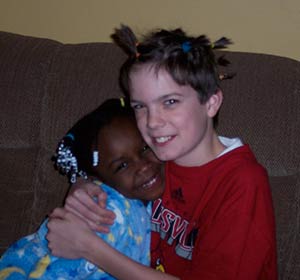 When Jacob, now a senior in high school, was about 12 and his sister Teenasia was 6, she convinced him to let her “do” his hair. Jacob sat patiently on the floor of the family room and watched TV as Teenasia painstakingly parted his straight, fine, brownish hair into about 10 sections and secured each one close to the scalp with a tiny rubber band. Occasionally, she’d use some African- American hair gel – called grease – to capture the flyaway hair for a tighter look.
When Jacob, now a senior in high school, was about 12 and his sister Teenasia was 6, she convinced him to let her “do” his hair. Jacob sat patiently on the floor of the family room and watched TV as Teenasia painstakingly parted his straight, fine, brownish hair into about 10 sections and secured each one close to the scalp with a tiny rubber band. Occasionally, she’d use some African- American hair gel – called grease – to capture the flyaway hair for a tighter look.
When she was done, Jacob looked ridiculous, yet he and Teenasia were enormously pleased with her work.
Our family just celebrated the one-year anniversary of Teenasia’s adoption. Teenasia first joined our family as a 1-year-old foster daughter. After a little more than a year, she was taken from our family and placed with her biological father, where she lived for about two and a half years.
When she was just under 5, Teenasia was detained from her father’s custody and brought back to us as foster daughter. Jacob was 11 at the time. She stayed just six months until the court once again decided her father should have another chance to try to be a parent. Just a year later, when Teenasia was 6, a social worker called with news that Teenasia needed emergency placement in our home – with a no-contact order on her biological father.
I will never forget telling 12-year-old Jacob that a social worker would be delivering Teenasia for what would turn out to be the final time.
 Twelve-year-old Jacob Scobey-Polacheck hugs his 6-year-old sister, Teenasia, after she gave him a new hairstyle. (Submitted photo courtesy the Scobey-Polacheck family)“Why?” He said, tears streaming down his face. “Why are they bringing her here – just to eventually take her away again? Why are they doing that to her? To us?”
Twelve-year-old Jacob Scobey-Polacheck hugs his 6-year-old sister, Teenasia, after she gave him a new hairstyle. (Submitted photo courtesy the Scobey-Polacheck family)“Why?” He said, tears streaming down his face. “Why are they bringing her here – just to eventually take her away again? Why are they doing that to her? To us?”
I didn’t have an answer for him. I couldn’t say that this time it would be permanent, because I had lost all trust in the system that had failed to protect Teenasia for the past five years.
I couldn’t say Teenasia would be all right, because I didn’t know if she would; she had endured so much. I don’t remember what I said, or if I said anything at all. I only remember that Jacob was blurry on the other side of my tears and I was surprised that his head already came up under my chin when I hugged him.
The childhood of all four of our kids has been punctuated by the grief and loss as well as the joy and readjustment that has accompanied Teenasia’s coming and going over the past decade. Jamie’s relatively quick adoption from the same foster care system made Teenasia’s ordeal all the more bewildering.
I have no doubt that the simultaneously painful and miraculous way we have become a family has had an influence on each one of my children. But I’m not sure I could tell you exactly how they are different because of what we have gone through together. For Liam, Teenasia and Jamie, it may be too early to ask.
But Jacob, at 17, can look back at the little boy he was when first Teenasia, and then Jamie, joined our family. He is old enough to recognize pieces of his world view that may have been shifted because of his sisters. Yet, amid the rush of homework, sports and endless laundry, Jacob and I don’t often have time to discuss topics of significance. I have rarely asked Jacob the question that underlies so much of my mothering: Jacob, how has the adoption of your sisters shaped you? But now I will.
(Annemarie and her husband Bill live in Glendale with their four children. They belong to Holy Family Parish, Whitefish Bay, and St. Francis of Assisi Parish, Milwaukee. Annemarie has received local and national awards for her writing on the intersection of faith and family life. Visit Annemarie’s website, discoveringmotherhood.com to read archived columns or excerpts from her other writing. Contact her at ascobey@gmail.com)
